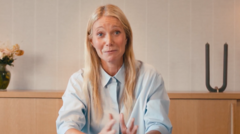In 2020, Rhea Chakraborty was thrust into the eye of a media storm following the tragic demise of actor Sushant Singh Rajput. Dubbed "the gold digger" and falsely accused of murder, Chakraborty’s life was upended, experiencing public vilification and a 27-day incarceration due to sensationalist allegations. Recently, India's Central Bureau of Investigation (CBI) revealed findings that conclude Rajput’s death was a suicide and cleared Chakroborthy and her family of any involvement, marking a crucial turning point in a case riddled with controversy.
### Media Trial Consigned to Oblivion as Bollywood Actress Rhea Chakraborty Exonerated

### Media Trial Consigned to Oblivion as Bollywood Actress Rhea Chakraborty Exonerated
A public witch hunt against actress Rhea Chakraborty culminates in a CBI investigation declaring her innocence in the death of Sushant Singh Rajput.
Despite the emotionally taxing circumstances that have befallen her, Rhea is beginning to reclaim her life. Her lawyer, Satish Maneshinde, confirmed that the CBI's extensive investigation resulted in the closure of the case, stating, “Innocent people were hounded and paraded before the media.” The sentiment resonated strongly among feminist advocates, who emphasized the case's troubling implications for the treatment of women in public discourse. As Chakraborty seeks to rebuild her career, the fallout from this media trial begs an examination of the ethics in journalism and the ramifications for innocent individuals caught in the rush for sensational news.
Chakraborty expressed lingering anger after the barrage of defamation she faced, stating, “I have not forgiven everyone. Some people are on my hit list,” hinting at the possible legal recourse amidst a drawn-out justice system. Backed by calls for accountability from fellow actors and legislators alike, the public demands reparations for the wreckage left in the wake of unfounded media scrutiny. Perhaps in this moment lies a chance for societal reflection—could the lessons learned from Chakraborty's experience foster a change in how public figures are treated, particularly women?
As Rhea Chakraborty continues her journey toward vindication and healing, the debate over journalistic integrity and the consequences of media trials in India remains at the forefront of public conversation, highlighting the urgent need for reform. The question of accountability lingers, driving calls for apologies from media figures who participated in the original fabrications and hysteria.
Although the CBI has closed the case, its effects will resonate in Bollywood and beyond, spurring renewed discussions on misogyny, societal pressure, and the toxic nature of media-fueled narratives.
Chakraborty expressed lingering anger after the barrage of defamation she faced, stating, “I have not forgiven everyone. Some people are on my hit list,” hinting at the possible legal recourse amidst a drawn-out justice system. Backed by calls for accountability from fellow actors and legislators alike, the public demands reparations for the wreckage left in the wake of unfounded media scrutiny. Perhaps in this moment lies a chance for societal reflection—could the lessons learned from Chakraborty's experience foster a change in how public figures are treated, particularly women?
As Rhea Chakraborty continues her journey toward vindication and healing, the debate over journalistic integrity and the consequences of media trials in India remains at the forefront of public conversation, highlighting the urgent need for reform. The question of accountability lingers, driving calls for apologies from media figures who participated in the original fabrications and hysteria.
Although the CBI has closed the case, its effects will resonate in Bollywood and beyond, spurring renewed discussions on misogyny, societal pressure, and the toxic nature of media-fueled narratives.


















